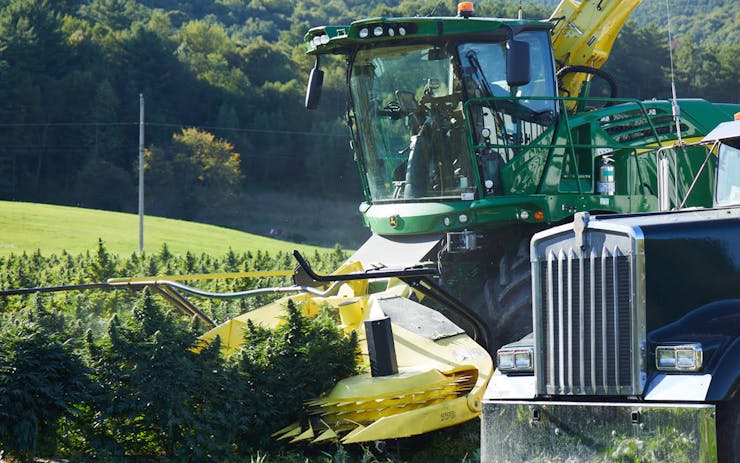This article is brought to you by Northeast Hemp Commodities, farming, harvesting, and processing CBD and CBG rich hemp.
Having grown up in Vermont farm country, and spending more than a decade as dairy farmers, Tylor Highter and Sam Berthiaume both share a love of the land and passion for the cannabis plant. In 2018, they switched gears, focusing solely on hemp farming, seed sourcing, and sharing hemp-farming knowledge with the broader Vermont agricultural community to create a vertically-integrated seed to sale brand – with products now available in about 70 stores in Vermont.
“Tylor and Sam sourced the seeds, came up with the farming plan, planted 50 acres, and assembled a team of five partners. Jumping headfirst into large scale hemp farming brought about many challenges, but this team faced them head-on and have had 2 successful growing seasons since the story began,” said Michael Sims, the chief brand officer at Northeast Hemp Commodities.

(Courtesy of Northeast Hemp)
The farm got its strong foundation from the chemistry and compassion shared between the founders, Vermont agriculture, and the wider hemp-farming community. It’s this bond between people with a love of farming that’s allowed them to grow and set their sights on changing and expanding the hemp industry.
An investment in not-so-minor cannabinoids
Cannabis is rich with plant compounds called cannabinoids, which interact with the human body to produce a variety of different effects. The two most popular, generally referred to as “major cannabinoids,” are THC and CBD.
Northeast Hemp Commodities started as a farm growing CBD-rich hemp, but they always knew there’s a lot more to the cannabis plant. Many other cannabinoids, often called “minor cannabinoids,” have effects of their own.
“These cannabinoids are only considered minor because most cannabis plants have been bred to have higher levels of THC and CBD due to consumer demand and too little research,” says Sims.
One of the lesser-known—but more important—cannabinoids is CBG, a chemical precursor to THC and CBD. Like CBD, it’s non-psychoactive and shows it has a lot of potential for addressing a variety of conditions. Most commercially available hemp and cannabis strains are low in CBG and other minor cannabinoids like CBC and CBN, but Northeast Hemp Commodities has prioritized growing raw material and smokeable flower with around 13% CBG.
Pushing past CBD with CBG discovery
“Plain CBD extracts are a dime a dozen right now,” says Sims. “Having CBG has opened the doors to a lot of different opportunities for us, and we want to get the word out there that we think it’s the next cannabinoid that consumers will be interested in. We’ve always tried to be one step ahead of what the broader market is doing, and we’re happy to start sharing some of our findings because we believe the hunt for plants and seeds that have minor cannabinoids is just beginning.”

Our greenhouse manager tending to CBG plants in the greenhouse (Courtesy of Northeast Hemp)
Being on the hunt for plants and seeds that have minor cannabinoids at a higher level is a constant pursuit for the Northeast Hemp Commodities team.
“The work,” he says, “is not just about finding proper genetics and isolating cannabinoids. It’s about blending the compounds to work together to create the perfect remedy for multiple different ailments.”
In states with legal cannabis, strains with various ratios of THC to CBD are common, so it makes sense that strains with CBD and CBG ratios can exist, too. In fact, the team at Northeast Hemp Commodities has paid attention to studies that suggest CBG can stunt the growth of other cannabinoids like THC. So for them, it has the potential to help hemp growers keep their THC levels below legal limits.
“That’s the future of cannabis,” says Sims.” Over the next five years, I think you’ll start to see a significant variation in cannabinoids being desired, grown, and formulated into products because as we all learn more about minor cannabinoids, you can see where they can help both growers and consumers out.”
Growing Vermont’s hemp industry with CBG
Northeast Hemp Commodities came from Vermont’s agriculture community. So, when other farms wanted to diversify their offerings, they made sure to help them start off on the right foot. After all, they want to propel the idea that hemp is as valuable as anything else they could choose to farm.

CBG plants waking up to morning dew and fog in Florence VT (Courtesy of Northeast Hemp)
“We wanted to protect fellow farmers by sharing our knowledge and helping them to prevent mistakes, so we helped them find the right seed genetics companies,” says Sims. “We also help them with their farming plans and irrigation plans, and work hand-in-hand with the state in terms of helping them craft their legislation and providing data to them so they can make the right decisions.”
For Northeast Hemp Commodities, the focus is on pushing the cannabis industry forward with research and perseverance, while knowing Vermont land and policy like the back of their hand.
“The reason they made such liberal hemp laws in Vermont was so anybody who felt like they could grow would go out and grow, so we actively help to make sure the proper hemp framework is put in place in our state,” says Sims.
While their feet are planted firmly on the ground, they’re still looking forward, hoping that it’s only a matter of time until their CBD and CBG hemp is in the hands of product developers and consumers – not just in the United States, but all across the world.

Seed to sale hemp products from Method Organics (Courtesy of Northeast Hemp)
Experience Northeast Hemp Commodities’ CBD for yourself with products from their sister brand,Method Organics.






